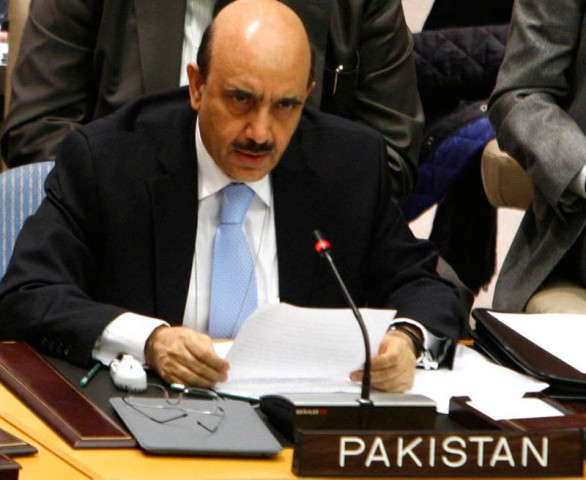Pakistan contesting ECOSOC seat
Country seeking election after a year’s gap.

Pakistan has announced its candidature for a seat on the Economic and Social Council (ECOSOC), the economic arm of the United Nations (UN), for the year 2015-2017.
The announcement, ahead of the 69th session of the General Assembly, was made by Pakistan’s UN Ambassador Masood Khan.
“If elected, Pakistan’s role will not be cosmetic, but substantive,” he declared before his distinguished guests that included New Zealand’s former prime minister James Bolger.
Pakistan is contesting an Asian seat, which is so far unchallenged. A two-third majority in the 193-member assembly is required for election.
With its third consecutive term expiring on December 2013, Pakistan is seeking election after a gap of a year. Khan said Pakistan had actively participated in reforming the Council and would continue its efforts to make this body more effective. He sought the support of member states for its candidacy, pledging to promote the purposes and objectives of ECOSOC.
First elected in 1954, Pakistan served as the ECOSOC in 1965-1967, 1969-1971, 1974-1977, 1979-1984, 1986-1988,1990-1992, 1994-1995, 1998-2003, 2005-2007, 2008-10 and 2010-13.
Of the ECOSCO’s 54 members, 18 retire each year. Seats have been distributed on geographical basis with 14 allocated to Africa, 11 to Asia, six to East Europe, 10 Latin America and 13 to Western Europe and other states.
The ECOSOC, a principal UN organ, coordinates economic, social, and related work of the 14 UN specialised agencies, functional commissions and five regional commissions. It serves as the central forum for discussing international economic and social issues.
Published in The Express Tribune, September 6th, 2014.
Like Business on Facebook, follow @TribuneBiz on Twitter to stay informed and join in the conversation.



















COMMENTS
Comments are moderated and generally will be posted if they are on-topic and not abusive.
For more information, please see our Comments FAQ